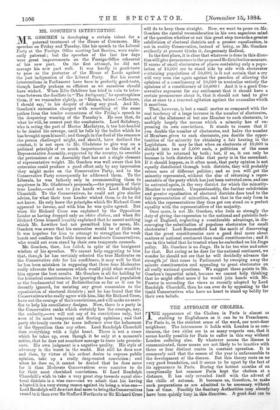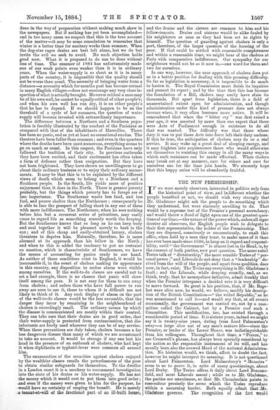THE APPROACH OF CHOLERA.
THE appearance of the Cholera in Paris i almost as startling to Englishmen as it can be to Frenchmen. For Paris is, in the strictest sense of the word, our next-door neighbour. The intercourse it holds with London is so con- tinuous, the two cities are in so many respects one, that it seems hardly possible for Paris to suffer in this way without London suffering also. By whatever means the disease is communicated, those means are not likely to be inactive with three or four distinct routes in constant operation. It is commonly said that the season of the year is unfavourable to the development of the disease. But this theory rests on no very good foundation, and it seems to be upset by the fact of its appearance in Paris. During the hottest months of an exceptionally hot summer Paris kept the cholera at a distance. It has only revealed itself with the advent of the chills of autumn. It becomes us, therefore, to make such preparations as are admitted to be necessary without loss of time. Possibly the Sanitary Authorities may already have been quietly busy in this direction, A good. deal can be
done in the way of preparation without making much show in the newspapers. But if nothing has yet been accomplished— and in too many cases we suspect that this is the true account of the matter—it may be some consolation to remember that winter is a better time for sanitary works than summer. When the dog-star rages drains are best left alone, lest we do but invite the evil we seek to avoid. No such objection holds good now. What it is proposed to do can be done without loss of time. The summer of 1884 has unfortunately made one of our weak points even weaker than it is in ordinary years. When the water-supply is so short as it is in many parts of the country, it is impossible that the quality should not be worse than usual. The necessity of bringing water from a distance—a necessity which for months past has become normal in many English villages—does not encourage any very close in- spection of what is actually brought. However critical a man may be of his own well, he cannot be equally critical of other people's; and when his own well has run dry, it is on other people's that he has to depend. If we should happen to be on the threshold of a cycle of hot summers, the question of water supply will become invested with extraordinary importance.
The difference between a Northern and a Southern popu- lation is forcibly illustrated by the conduct of the Parisians as compared with that of the inhabitants of Marseilles. There has been no panic, and as yet at least no sensational exodus. The theatres have been fuller than common ; and even in the quarters where the deaths have been most numerous, everything seems to go on much as usual. In this respect, the Parisians have only followed the tradition of their city. In previous outbreaks they have been excited, and their excitement has often taken a form of defiance rather than resignation. But they have not been frightened. They have shown no unwillingness to go about their ordinary business or to enjoy their ordinary amuse- ments. It may be that this is to be explained by the different views of death which seem to belong to a Northern and a Southern people. In the South, life yields more of positive enjoyment than it does in the North. There is greater poverty probably, but the things which poverty has to forego are of less importance. The Southerner wants less food, and less fuel, and poorer shelter than the Northerner ; consequently he is able to face the prospect of falling short in any one of them with more indifference. The Northerner, when he sees nothing before him but a recurrent series of privations, may easily come to regard life as something scarcely worth the keeping. But the Southerner knows that so long as he can keep body and soul together it will be pleasant merely to bask in the sun ; and of this cheap and easily-obtained luxury, cholera threatens to deprive him. Naturally, therefore, he is more alarmed at its approach than his fellow in the North ; and when to this is added the tendency to put no restraint on emotion, which is characteristic of Southerners, we have the means of accounting for panics ready to our hand. As neither of these conditions exist in England, it would be inexcusable if, in the event of cholera making its appearance in this country, any disposition to undue alarm were visible among ourselves. If the well-to-do classes are careful not to set a bad example, there is no chance that panic will show itself among the poor. It is not easy for them to run away from cholera ; and unless those who have full power to run away are seen to use it, those to whom it is difficult are not likely to think of it. Any such display of alarm on the part of the well-to-do classes would be the less excusable, that the danger they incur by remaining in the neighbourhood of cholera is exceedingly small. The ordinary means by which the disease is communicated are mostly within their control. They can take care that their drains are in good order, that their water-supply is protected from contamination, that dis- infectants are freely used wherever they can be of any service. When these precautions are duly taken, cholera becomes a far less dangerous disease than many of which we are accustomed to take no account. It would be strange if any one lost his head in the presence of an outbreak of cholera, who had kept it when diphtheria or typhoid-fever were common all around him.
The enumeration of the securities against cholera enjoyed by the wealthier classes recalls the powerlessness of the poor -to obtain similar safeguards for themselves. To the dweller in a London court it is a- mockery to recommend investigation into the state of his drains or his water-supply. He has not the money which it would cost to put them into good order ; and even if the money were given to him for the purpose, he -would have no certainty of reaping the benefit. He is merely
atienaa4t.will a the fractional part of an ill-built house,
and the drains and the cistern are common to him and his fellow-tenants. Drains and cisterns would be alike fouled by his neighbours as soon as they had been set to rights by himself. The question of guarding against cholera is only a part, therefore, of the larger question of the _housing of .the poor. If that could be settled with reasonable completeness and within a reasonable time we might hear of the cholera at Paris with comparative indifference. Our sympathy for-our neighbours would not be as it now is,—one word for them and two for ourselves.
In one way, however, the near approach of cholera does _put us in a better position for dealing with this pressing difficulty. So far as legislation is necessary, it is impossible to do much to hasten it. The Royal Commission must finish its inquiries and present its report ; and by the time that this has become the foundation of a Bill, cholera may easily have slain its thousands. But apart from legislation, there is a field of unascertained extent open for administration, and though administration under this kind of pressure does not always become wiser, it very often becomes more active. It will be remembered that when the "bitter cry" was first raised a year ago, it was asserted by more than one expert that there were Acts of Parliament enough in existence to do all that was wanted. The difficulty was that those whose duty it was to put these Acts into force left their duty, undone. If this be true, the anticipation of cholera may do us a real service. It may wake up a great_ deal of sleeping energy, and it may frighten into acquiescence those who would otherwise set themselves to resisting this energy in all the many ways in which such resistance can be made effectual. When cholera may break out at any moment, care for others and care for ourselves can for the time join hands. We sincerely hope that this happy union will be abundantly fruitful.



































 Previous page
Previous page